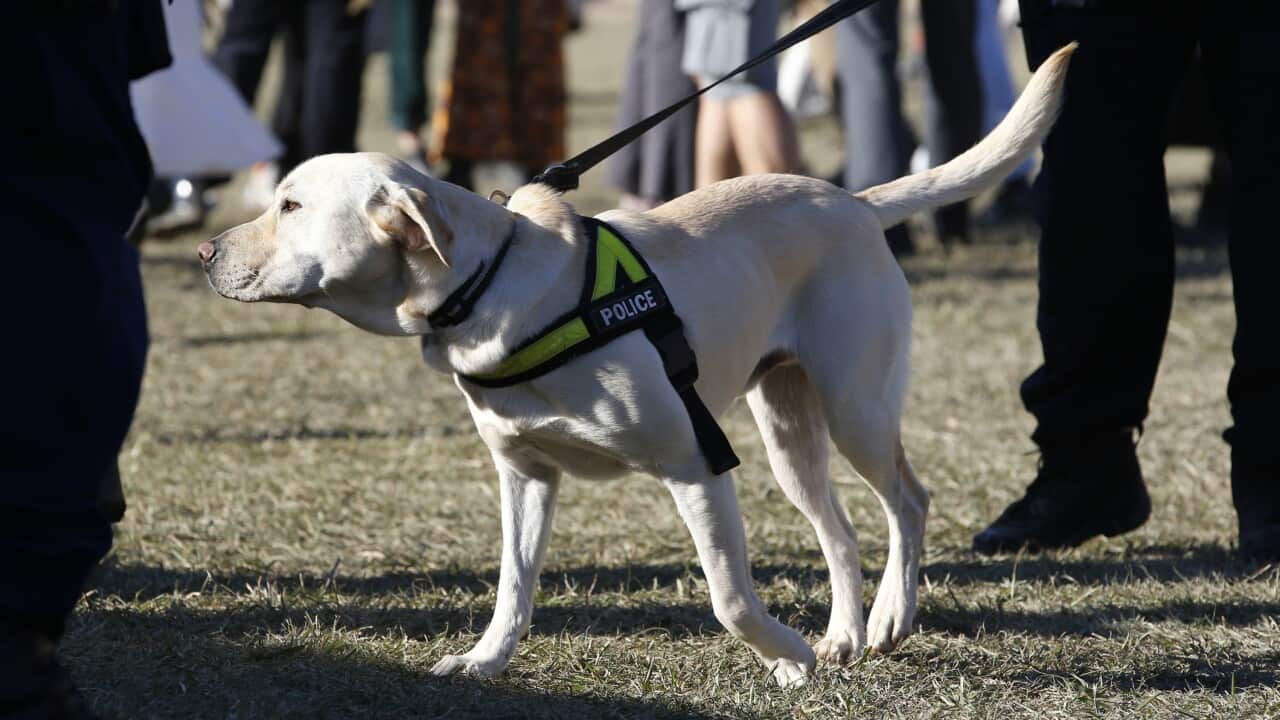Victoria Police says there won’t be drug detection dogs at the state’s first music festival to trial pill testing, but the force in NSW hasn’t ruled it out.
The three-day Beyond the Valley music festival, set to be held in western Victoria over the New Year period, will see the debut festival appearance for pill testing in the state.
The , with the state government also expected to open a site in inner Melbourne that could become a permanent fixture.
There is concern among Victorian crossbench politicans — including from the Greens and Animal Justice Party, which both pushed for the trial — that sniffer dogs will be used at the festivals that offer drug testing. They’ve said their presence would put lives at risk as revellers with illicit substances may take all their drugs at once in a bid to avoid detection.
Victoria Police told SBS News that officers would be patrolling Beyond the Valley in order to “ensure the safety of festival-goers and deter any criminal activity or anti-social behaviour”, but they would not be using drug detection dogs.
“Police will continue to enforce against drug offences away from the drug-checking place and seize any illicit substances,” a Victoria Police spokesperson said in a statement. “As always, police may use discretion to not enforce possession offences.”
The spokesperson said officers would not patrol the drug testing site itself and would only attend if police assistance was requested.
Beyond the Valley will be the first Victorian music festival to offer a pill testing service. Source: Facebook / Facebook/beyondthevalley
Victoria Police would not tolerate drug traffickers and officers would have “no hesitation arresting and charging someone for this offence”, including within the vicinity of a drug-checking site, the spokesperson said.
But Victoria Police did not rule out the use of sniffer dogs at future festivals, including those with drug-checking services.
“We will continue to work with the Department of Health which is the lead agency on Victoria’s drug-checking trial,” the spokesperson said.
In the Victorian Parliament’s last sitting week of the year, upper house Animal Justice Party MP Georgie Purcell said she hoped the chamber would debate a motion to end the use of drug detection dogs at festivals early in 2025.
She has said “let the doggies be doggies” and that the use of sniffer dogs is “counterproductive”.
“If we’re serious about drug harm reductions, we need to let people feel safe using the [pill testing] service,” she wrote in a social media post earlier this month.
“Sniffer dogs aren’t sniffing out any solutions — it’s time we stop relying on them.”
Will sniffer dogs be used at NSW festivals?
NSW announced on Thursday it would .
The NSW government said that, while drug possession will remain illegal, amnesty zones will be applied around testing sites.
Health Minister Ryan Park said police would not use sniffer dogs in the “immediate area where the drug testing is going on”.
SBS News asked NSW Police whether they would not be used at festival sites at all. A spokesperson did not rule out their presence, saying officers would continue to target drug suppliers.
“If someone attends any music festival with quantities of drugs and an intention to supply those drugs, they can expect to be the target of any police operation, which may include the use of drug detection dogs,” a NSW Police spokesperson said.
The NSW pill-testing trial comes five years after a 2019 inquiry into the deaths of six young people at music festivals when coroner Harriet Grahame found evidence to support community and festival-based services was “compelling”.
That recommendation was rejected by the then-Liberal government, which opted instead for amnesty bins at festival entrances.
NSW Police and NSW Health will implement the trial, which will cost more than $1 million to roll out and be independently evaluated.
It’s expected to begin as early as February, although that will be after many of the larger summer festivals.
The decision follows interim advice from the NSW Drug Summit held in November and December ahead of a final report due in early 2025.
With additional reporting by the Australian Associated Press.

